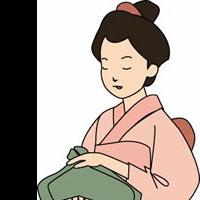お ネズミ が お 死んでる
お|ネズミ|が|お|しんでる
honorific prefix|mouse|subject marker|honorific prefix|is dead
The mouse is dead.
秋田県 の 民話
あきたけん|の|みんわ
Akita Prefecture|attributive particle|folk tales
A folktale from Akita Prefecture.
むかし むかし 、ある 田舎 の 娘さん が 、町 の お金持ち の 家 へ 働き に 行きました 。
むかし|むかし|ある|いなか|の|むすめさん|が|まち|の|おかねもち|の|いえ|へ|はたらき|に|いきました
long ago|long ago|a|countryside|attributive particle|daughter|subject marker|town|attributive particle|rich person|attributive particle|house|direction particle|work|locative particle|went
Once upon a time, a girl from the countryside went to work at the house of a wealthy person in town.
でも 、田舎 で 育った 娘さん は 、ていねいな 言葉 を うまく 使う こと が できません 。
でも|いなか|で|そだった|むすめさん|は|ていねいな|ことば|を|うまく|つかう|こと|が|できません
but|countryside|at|grew up|daughter|topic marker|polite|language|object marker|well|use|thing|subject marker|cannot do
However, the girl raised in the countryside could not use polite language well.
お客さん に お茶 を 出す とき も 、「茶 を 飲め 」など という ので 、お金持ち の おかみさん は 困って しまい ました 。
おきゃくさん|に|おちゃ|を|だす|とき|も|ちゃ|を|のめ|など|という|ので|おかねもち|の|おかみさん|は|こまって|しまい|ました
customer|to|tea|object marker|to serve|when|also|tea|object marker|drink (imperative form)|etc|called|because|rich|possessive particle|landlady|topic marker|troubled|ended up|did
When serving tea to the guests, saying things like, 'Drink the tea,' caused trouble for the wealthy hostess.
そこ で 娘さん に 、「お客さん に は 、ていねいな 言葉 を 使わなくては いけません 。
そこ|で|むすめさん|に|おきゃくさん|に|は|ていねいな|ことば|を|つかわなくては|いけません
there|at|daughter|to|customer|to|topic marker|polite|words|object marker|must not use|must not
So she advised her daughter, 'You must use polite language with the guests.
何でも 言葉 の 初め に 、『お 』という 字 を つけて 言いなさい 。
なんでも|ことば|の|はじめ|に|お|という|じ|を|つけて|いいなさい
anything|words|attributive particle|beginning|locative particle|honorific prefix|called|character|object marker|attach|say
Always start any word with the character 'o' when you speak.
そう すれば 、ていねいな 言葉 に なり ます よ 」と 、注意 した のです 。
そう|すれば|ていねいな|ことば|に|なり|ます|よ|と|ちゅうい|した|のです
like that|if you do|polite|words|to|become|will|emphasis particle|quotation particle|warning|did|you see
That way, it will become polite language.'
(茶 に 『お 』を つければ 、お 茶 。
ちゃ|に|お|を|つければ|お|ちゃ
tea|locative particle|honorific prefix|object marker|if you attach|honorific prefix|tea
( If you add 'o' to 'cha', it becomes o-cha.
なるほど 、『お 』と いう 字 を つければ いい んだ な )
なるほど|お|と|いう|じ|を|つければ|いい|んだ|な
I see|honorific prefix|quotation particle|called|character|object marker|if you attach|good|you see|right
I see, so I just need to add the character 'o'.
それ から 娘さん は 、いろいろな 言葉 に 、『お 』という 字 を つけて みました 。
それ|から|むすめさん|は|いろいろな|ことば|に|お|という|じ|を|つけて|みました
that|after|daughter|topic marker|various|words|locative particle|honorific prefix|called|character|object marker|attached|tried
After that, the girl tried adding 'o' to various words.
ネコ は → お ネコ 、 カラス は → お カラス 、 カボチャ は → お カボチャ 。 ( これ で 、 もう 大丈夫 )
ねこ|||ねこ|からす|||からす|かぼちゃ|||かぼちゃ||||だいじょうぶ
Cat → o-neko, crow → o-karasu, pumpkin → o-kabocha. (With this, it's all good now.)
娘 さん は 、『お 』と いう 字 を つけた 言葉 を 、早く 使い たくて たまりません 。
むすめ|さん|は|お|と|いう|じ|を|つけた|ことば|を|はやく|つかい|たくて|たまりません
daughter|Mr/Ms|topic marker|honorific prefix|quotation particle|to say|character|object marker|attached|word|object marker|quickly|use|want to|can't wait
My daughter can't wait to use words that have the character 'o' attached to them.
家 の 前 で ウロウロ して いたら 、ネズミ が どぶ に 落ちて 死んで い ました 。
いえ|の|まえ|で|ウロウロ|して|いたら|ネズミ|が|どぶ|に|おちて|しんで|い|ました
house|attributive particle|in front|at|wandering around|doing|if (you) were|mouse|subject marker|ditch|locative particle|fell|died|is|was
While wandering in front of the house, a mouse fell into the ditch and died.
娘 さん は さっそく 、おかみ さん の 部屋 に かけつけて 、「おおかみ さん 、お ネズミ が おどぶ に 落ちて お 死んで る 」と 、言い ました 。
むすめ|さん|は|さっそく|おかみ|さん|の|へや|に|かけつけて|おおかみ|さん|お|ネズミ|が|おどぶ|に|おちて|お|しんで|る|と|いい|ました
daughter|Mr/Mrs/Ms (honorific)|topic marker|immediately|landlady|Mr/Mrs/Ms (honorific)|possessive particle|room|locative particle|rushed|wolf|Mr/Mrs/Ms (honorific)|honorific prefix|mouse|subject marker|drain|locative particle|fell|honorific prefix|dead|is|quotation particle|said|did
My daughter immediately ran to the landlady's room and said, 'Landlady, a mouse has fallen into the ditch and died!'
おかみ さん と 一緒に いた お客 さん は 、それ を 聞いて 大笑い です 。
おかみ|さん|と|いっしょに|いた|おきゃく|さん|は|それ|を|きいて|おおわらい|です
landlady|honorific suffix|and|together|was|customer|honorific suffix|topic marker|that|object marker|heard|big laugh|is
The guests who were with the landlady burst out laughing upon hearing that.
お客さん が 帰った あと 、おかみさん は 娘さん に 言いました 。
おきゃくさん|が|かえった|あと|おかみさん|は|むすめさん|に|いいました
customer|subject marker|went home|after|innkeeper|topic marker|daughter|locative particle|said
After the customers left, the innkeeper said to her daughter.
「何でもかんでも 、『お 』という 字 を つけて はいけません 。
なんでもかんでも|お|という|じ|を|つけて|はいけません
everything|honorific prefix|called|character|object marker|attach|must not
"You must not attach the character 'o' to everything.
役 に 立つ とき だけ 、『お 』の 字 を つけなさい 」(そうか 、役 に 立つ とき だけ か )
やく|に|たつ|とき|だけ|お|の|じ|を|つけなさい|そうか|やく|に|たつ|とき|だけ|か
useful|at|stand|when|only|honorific prefix|attributive particle|character|object marker|attach|I see|useful|at|stand|when|only|question marker
Only when it is useful, should you add the 'o' character" (I see, only when it is useful).
さて 、その 晩 の こと 。お金持ち の 家族 が 晩ごはん を 食べている ところ へ 、娘さん が お味噌汁 を 運んできました 。
さて|その|ばん|の|こと|おかねもち|の|かぞく|が|ばんごはん|を|たべている|ところ|へ|むすめさん|が|おみそしる|を|はこんできました
well|that|evening|attributive particle|thing|rich|attributive particle|family|subject marker|dinner|object marker|is eating|place|direction marker|daughter|subject marker|miso soup|object marker|brought
Now, that evening. The daughter brought miso soup to the wealthy family who was having dinner.
ふと おかみさん を 見る と 、おかみさん の おでこ に 、おひたし の なっぱ が ついて い ます 。
ふと|おかみさん|を|みる|と|おかみさん|の|おでこ|に|おひたし|の|なっぱ|が|ついて|い|ます
suddenly|innkeeper|object marker|to see|and|innkeeper|possessive particle|forehead|locative particle|blanched vegetables|attributive particle|leafy greens|subject marker|is attached|is|polite ending
When I suddenly looked at the innkeeper, I noticed that there was a piece of boiled greens stuck to her forehead.
そこ で 娘さん は 、大声 で 言い ました 。「かみさん 、でこ に ひたし の なっぱ が ついて 、かし いだよ 」
そこ|で|むすめさん|は|おおごえ|で|いい|ました|かみさん|でこ|に|ひたし|の|なっぱ|が|ついて|かし|いだよ
there|at|daughter|topic marker|loud voice|with|said|did|Mrs|forehead|locative particle|wet|attributive particle|leaves|subject marker|attached|it's true|you know
At that moment, the daughter said loudly, "Innkeeper, you have boiled greens stuck to your forehead, it's funny!"
(・・・・・・・ああ 、この 娘 に は 、何と 言ったら わかる のだろう )おかみさん は 、ガッカリ して 、「そういう 時 は 、『おかみさん 、おでこ に おひたし の なっぱ が ついて 、おかしい です よ 』と 言う んです よ 」と 、言い聞かせました 。
ああ|この|むすめ|に|は|なんと|いったら|わかる|のだろう|おかみさん|は|ガッカリ|して|そういう|とき|は|おかみさん|おでこ|に|おひたし|の|なっぱ|が|ついて|おかしい|です|よ|と|いう|んです|よ|と|いいきかせました
ah|this|girl|locative particle|topic marker|what|if you say|will understand|I wonder|innkeeper|topic marker|disappointed|doing|that kind of|time|topic marker|innkeeper|forehead|locative particle|boiled greens|attributive particle|leafy vegetables|subject marker|is attached|funny|is|emphasis particle|quotation particle|say|you see|emphasis particle|quotation particle|taught
(...... Ah, what can I say to make this daughter understand?) The innkeeper, feeling disappointed, explained, "In such cases, you should say, 'Innkeeper, you have boiled greens stuck to your forehead, it's strange!'"
すると 娘 さん は 、ニッコリ わらって 、「お やっぱり 『お 』の 字 を おつけた ほうが 、おいいん だ べ 」と 、言った のです 。
すると|むすめ|さん|は|ニッコリ|わらって|お|やっぱり|お|の|じ|を|おつけた|ほうが|おいいん|だ|べ|と|いった|のです
and then|daughter|honorific suffix|topic marker|smiling|laughing|honorific prefix|of course|honorific prefix|attributive particle|character|object marker|attached|better|good|is|right|quotation particle|said|you see
Then the daughter smiled and said, "Well, it's better to add the 'o' character, isn't it?"
SENT_CWT:AfvEj5sm=5.56 PAR_TRANS:gpt-4o-mini=2.09
en:AfvEj5sm
openai.2025-02-07
ai_request(all=30 err=0.00%) translation(all=24 err=0.00%) cwt(all=345 err=4.64%)

